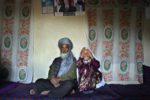This piece is also posted at Muslim Lookout.
I know I just talked about this last week, but all these questions about Canada’s involvement with the rights of Afghan women have remained a major news story, so I thought it was worth doing a follow-up. There are still quite a few articles out there about how the new law that came out a couple weeks ago is making everyone question Canada’s mission in Afghanistan (yeah, I know: Canada’s military has been there how long and people are only asking these questions now??)
This article by Sandra Martin, printed this past weekend in the Globe and Mail, is pretty typical of a lot of the issues that are being mentioned. Like many of the media perspectives I discussed last week, it talks about the Afghan government’s support of the new law as “the ultimate betrayal,” as if it is a move deliberately and primarily intended to offend the Canadian mission in the country. (Interestingly, the specific language around “betrayal” is always talked about in terms of a betrayal of Canadian expectations, and not of Afghan women.)
The article further exposes some of the other assumptions that are being made in many of the discussion about this issue within Western media. Its constant use of “us” and “our” – in reference to Canada and Canadians, and in particular to the Canadian military – creates a rigid division, assuming that all Canadians are similar and united, and fundamentally different from Afghans. When she says that Margaret Atwood “continues to question why we were there in the first place” and “doesn’t feel we can just pack up our kit bags,” Martin implies that all of “us” are somehow in Afghanistan, and so closely linked with the Canadian military that its kit bags are “ours” as well. She also writes that although it used to be “that intractable problem over there, Afghanistan is now a seething issue on our streets, around dinner tables and in meeting rooms in Canada.” She seems to assume here that it is only since Canada’s role in the NATO invasion of Afghanistan in 2001 that Afghanistan has been an issue for Canadians.
I know it might seem overly nitpicky to get all concerned about a pronoun, but the use of “we” and “our” is always worth questioning. It is often an exclusive term (if “we” did not care about Afghanistan prior to 2001, then this “we” doesn’t really include Afghan-Canadians; if “we” are fighting in Afghanistan, then the “we” also pushes aside many Canadians who disagree with the Afghan mission.) It is also a term that tends to create a moral binary as well, placing “us” on the side that is morally superior and more modern and progressive than the Afghan “them.”
Martin also seems to assume that military intervention is the only way to support Afghan women. She writes that, throughout the course of Canada’s military involvement in the country, “those with a reflexively anti-war disposition found themselves torn between their opposition to military intervention and their concern for the plight of Afghan’s most vulnerable: its female population.” Even if we ignore the overly patronising tone of “a reflexively anti-war disposition” (as if being anti-war is just a reflex, and not a result of some critical reflection), the statement is bizarre also because of its suggestion that opposing military intervention and supporting Afghanistan’s female population are mutually exclusive positions. In fact, many people who were initially opposed to the military intervention opposed it precisely because they felt that such an intervention would hurt Afghanistan’s female population. Moreover, many of these people were also people who were concerned about Afghanistan’s female population even before 2001, a possibility this article seems to deny altogether.
On the other hand, Martin does bring in some quotes that give some nuance to the debate. For example, she begins by quoting Farah Mohamed, a Muslim woman who tells us that “I grew up in Canada in a Muslim home where respect and the advancement of women are normal and I was horrified by this law.” It was nice to see an affirmation, especially right at the beginning of the article, of the possibility of being a Muslim woman who grew up in a household that would teach her to be horrified by this law.
Martin also writes that:
Some people think there are better ways of improving the lot of women than pouring in guns and soldiers.
“How has the war helped women in Afghanistan? It hasn’t,” Judy Rebick, former head of the National Action Committee on the Status of Women, says. Instead, she argues, life is worse for women since the occupation. “Never have women achieved equality by somebody coming in and giving it to them. We can’t bomb our way into equality.”
Rather than sending in troops to intervene in a society “that doesn’t want them,” she thinks countries such as Canada should have supported existing groups like RAWA, the Revolutionary Association of the Women of Afghanistan, which has been organizing non-violently against the Taliban and struggling to establish women’s rights since 1977. “We should never have gone into Afghanistan in the first place, and we should leave.”
I’m glad that she included this quote, and that she mentioned that there have been women active in women’s rights issues since 1977 (although she could have mentioned that these struggles go back even further.) Although much of the article made me cringe, and overall did little to really challenge the idea of Canada as a benevolent power bringing nothing but good to those poor Afghans, she did bring in more complexity than some other articles have on this issue.
And I know this is petty, but I have to mention Martin’s token headscarf reference, where she reflects on some of the media coverage about Afghan women protesting the law, and writes that “seeing them march with their faces uncovered and their veils pulled back to show some hair was a hopeful sign that women are feeling strong enough to protest against an unjust law.” Because pulling your veil back to show some hair is a true sign of liberation. *rolling eyes*



